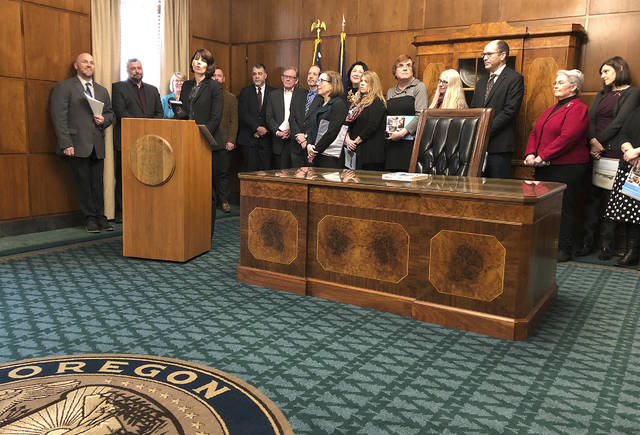SALEM, Ore. — Lawmakers in the Oregon Senate approved a bill Tuesday that aims to protect home renters amid a statewide housing crisis, with the measure restricting landlords from terminating a tenancy and from imposing large rent increases.
The bill passed on Tuesday with 17 in favor and 11 opposed. It now goes to the House. If passed, it would be one of the first state-wide rent control laws in the United States.
Sen. Tim Knopp, a Republican from Bend, said before he voted against the measure that it doesn’t address the supply issue. Oregon has a serious shortage of affordable housing.
But in testimony for a recent hearing on the bill, Bend resident Eric Lint said it is needed because rents are skyrocketing, causing multiple impacts.
He said the medical lab where he works is chronically understaffed, with potential hires citing a lack of affordable housing in Bend, a town that lies in the shadow of the Cascade Range and has attracted droves of outdoor enthusiasts, retirees and entrepreneurs, causing a population boom.
Lint’s hourly pay has risen 8 percent over five years. Meanwhile, his rent has increased 66 percent. He plans to move away in the fall.
Sen. Jeff Golden, D-Rogue Valley, told fellow senators before he voted yes that the alternative to the bill is to say: “Sorry Oregon renters, you’re on your own.”
The Oregon Rental Housing Association, which describes itself as the only state association whose focus is the smaller rental owner/operator, has a neutral position on the bill.
“After reviewing this bill, I believe most landlords will be able to adapt and operate within the parameters,” said Jim Straub, the rental association’s legislative director. He said in written testimony the proposed law protects good tenants while not encouraging landlords to leave the business and invest their money elsewhere.
The bill prohibits landlord from terminating month-to-month tenancy without cause after 12 months of occupancy. It also limits maximum rent increases to once per year, and to 7 percent above the annual change in the consumer price index.
It also allows landlord to terminate tenancy with 90 days’ written notice and payment of one month’s rent, with exemptions in some cases. A landlord can refuse to renew a fixed term tenancy if the tenant receives three lease violation warnings within 12 months and the landlord gives 90 days’ notice.
Another bill, on the House side of the Legislature, addresses the housing shortage. That bill had a public hearing Monday.
It would require cities and counties to allow duplexes and some higher-density housing — but not large apartment complexes — in lands zoned for single-family dwellings.
Under Oregon law, cities and towns have urban growth boundaries to control urban expansion onto farms and forests. But zoning within those boundaries has historically been handled by local governments, said House Speaker Tina Kotek, D-Portland. Kotek told reporters Monday she expects “pushback” from cities.
“This is new for the state to come in and look for additional allowances in residential areas,” she said Monday before she testified at the public hearing.
Around 30,000 housing units must be built per year to meet the current deficit in housing and to build for the future as more people move to the state, Kotek said.
Kotek is a co-sponsor of the Senate bill on renter protections, along with Sen. Ginny Burdick, who is from Portland and is the Senate majority leader; and Sen. Laurie Monnes Anderson, D-Gresham.
———
Follow Andrew Selsky on Twitter at https://twitter.com/andrewselsky


